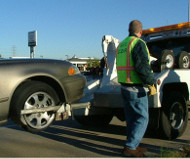1/6/2016
Congress Curtails Automobile And Other Asset SeizuresCongress reins in car confiscation by seizing Justice Department asset seizure funds.

Grabbing cars belonging to individuals accused of drug crimes has been a profitable enterprise for federal and local law enforcement -- until now. In the omnibus spending bill signed in November, Republican congressional leaders used the power of the purse to pull $1.2 billion out of the pockets of local lawmen. Because Congress took the funds out of the asset seizure account, Department of Justice officials had no choice but to suspend the program a few days before Christmas.
"While we had hoped to minimize any adverse impact on state, local, and tribal law enforcement partners, the department is deferring for the time being any equitable sharing payments from the program," asset seizure chief M. Kendall Day wrote in a letter to local officials.
In the past, local law enforcement used the "equitable sharing program" to bypass state restrictions on asset seizure by using federal procedures. Justice would keep 20 percent of the funds and "share" the remaining 80 percent with the local agencies.
In Tennessee, for example, motorist El A. Willis was stopped by a local sheriff's deputy and had the $18,480 he was carrying to make a music deal confiscated. The deputy claimed his dog alerted on the cash, but no drugs were found and Willis was never charged with a crime. After spending nearly two years fighting in federal court, Willis finally received his money back.
Items seized typically include cash, homes and weapons, but automobiles are a prime target. In Arkansas, 9537 cars were seized according to the Legislative Joint Auditing Committee. In three years, Washington, DC grabbed 339 vehicles worth $2,521,580. Iowa generated $15,827,361 from vehicle seizures -- more than it grabbed in real property, cash or other items.
Although asset forfeiture involves taking more than automobiles, law enforcement sometimes prefers to spend the cash on new cruisers. In Anaheim, the tenth largest city in California, police used equitable sharing funds to spend $10,979,723 on new vehicles and payments to informants who helped identify money to seize. A Justice Department Inspector General report in December found the department had followed the letter of the law in doing so. Members of Congress felt it was time to change that law.
"Reliance on the fund to offset the day-to-day operations, or to pay for new activities, creates an incentive to pursue cases suspected of high valued forfeitures rather than to target individuals or organizations that perpetrate the worst crimes against society," a House committee report explained regarding the rescission.
The congressional seizure of the Justice Department asset seizure fund only lasts for the 2016 budget cycle. Justice intends to restore the program if Congress does not re-enact the policy next year.
A copy of the Justice Department announcement is available in a 900k PDF file at the source link below.


